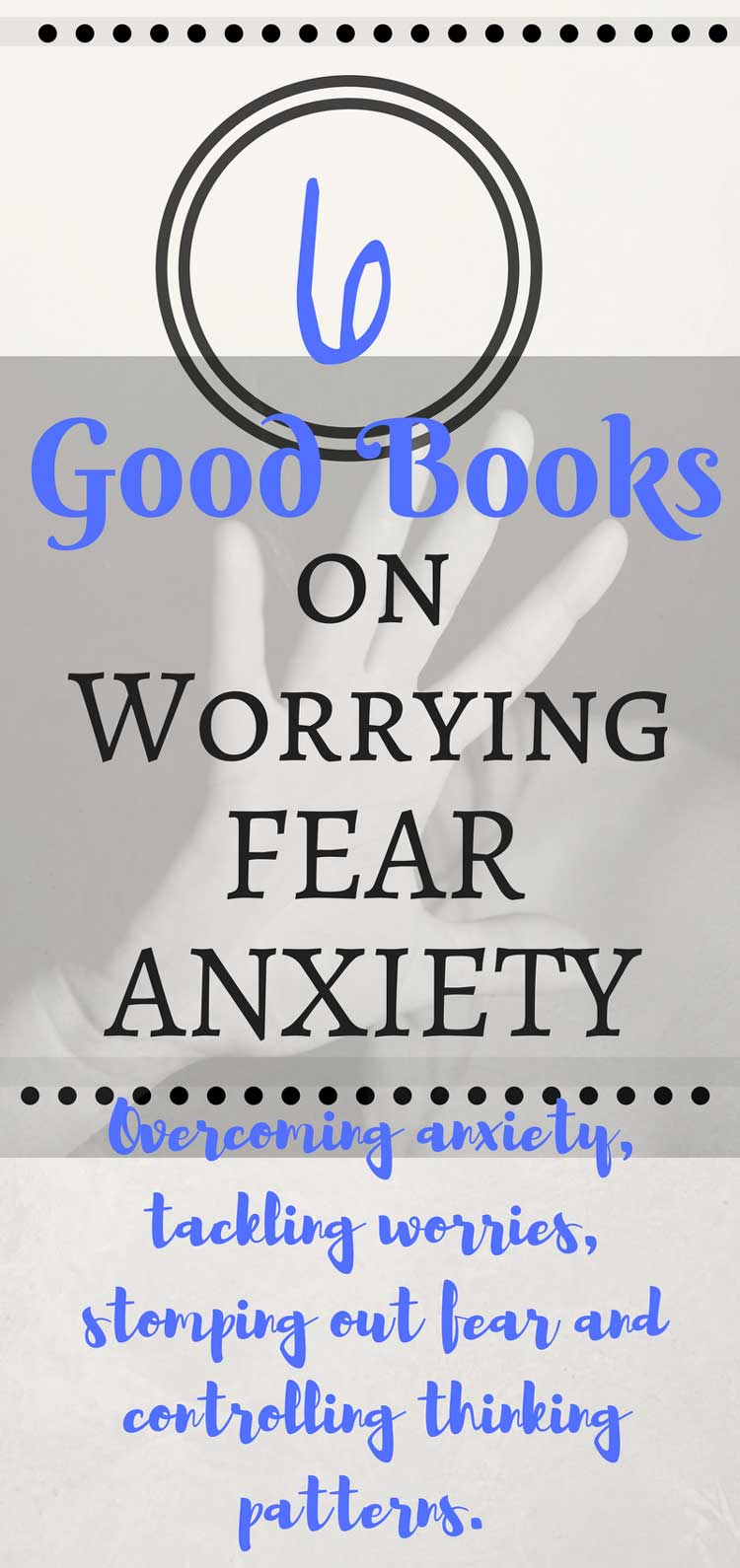We are now in the hectic and wild time of the year. A lot of people find the holiday season to be the hardest time of the year. Whether you are surrounded by loads of family or all alone during the holidays, this season can wreck havoc on anyone’s emotions. If you think reading a book about worrying less, calming anxiety, overcoming fear and controlling thinking patterns would be beneficial to you or someone you know… I’ve got a few suggestions on books about worrying!
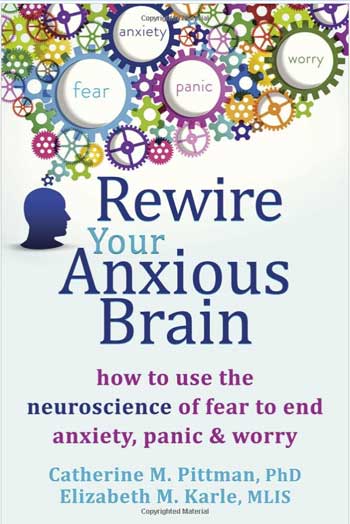 1) Rewire Your Anxious Brain How to Use the Neuroscience of Fear to End Anxiety, Panic, and Worry Catherine M Pittman PhD, Elizabeth M Karle MLIS
1) Rewire Your Anxious Brain How to Use the Neuroscience of Fear to End Anxiety, Panic, and Worry Catherine M Pittman PhD, Elizabeth M Karle MLIS
About the Book:
My Thoughts:
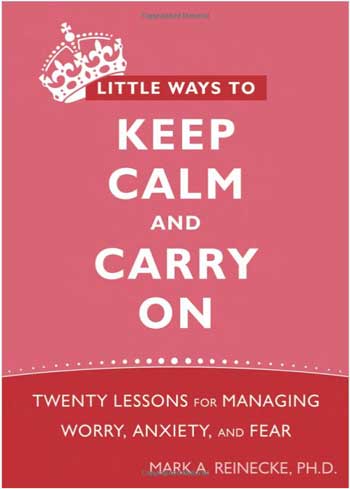 2) Little Ways to Keep Calm and Carry On Twenty Lessons for Managing Worry, Anxiety, and Fear Mark Reinecke PhD
2) Little Ways to Keep Calm and Carry On Twenty Lessons for Managing Worry, Anxiety, and Fear Mark Reinecke PhD
About the Book:
First featured on a British poster produced during World War II, “Keep calm and carry on” has become the mantra of millions—but exactly how to keep calm remains a difficult question for most of us.
The next time you are stressed by pressures at work, overwhelmed by life’s challenges, or panicked by problems that seem unsolvable, reach for this book. In Little Ways to Keep Calm and Carry On, you’ll find twenty short yet powerful lessons and anxiety-reducing techniques that will help you move past stressful moments with grace. Each lesson is so simple to learn and practice, you’ll find that this pocket guide is all you really need whenever you need a little help keeping calm.
My Thoughts:
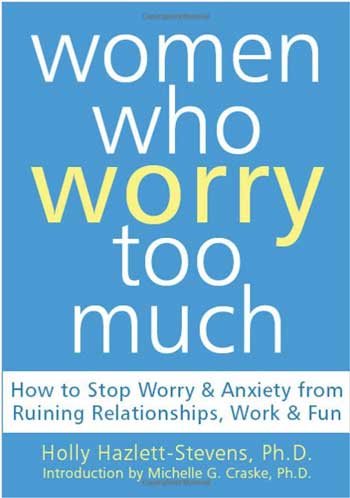 3) Women Who Worry Too Much How to Stop Worry and Anxiety from Ruining Relationships, Work, and Fun Michelle G. Craske PhD, Holly Hazlett-Stevens PhD
3) Women Who Worry Too Much How to Stop Worry and Anxiety from Ruining Relationships, Work, and Fun Michelle G. Craske PhD, Holly Hazlett-Stevens PhD
About the Book:
Women are more likely than men to develop anxiety disorders, a fact which researchers have attributed to a range of biological, psychological, and cultural factors. The goal of this book is to help readers control excessive worry by learning to perceive threats more accurately and to stop focusing on things that are unlikely to happen.
This book addresses the fundamentals of worry: what it is, how it differs from anxiety, and how it can develop into a chronic state of mind. The book offers strategies for overcoming worry that include monitoring personal worry triggers, breaking worry-provoking habits, and avoiding avoidance-a major aggravating factor for all anxiety disorders. From it, you’ll learn to use mindfulness techniques to avoid ruminating on the past or the future and how to use progressive relaxation to cope with worrisome situations.
My Thoughts:
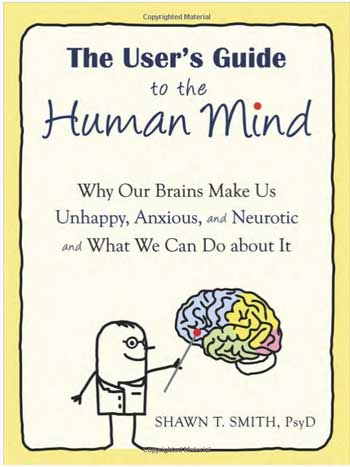 4) The User’s Guide to the Human Mind Why Our Brains Make Us Unhappy, Anxious, and Neurotic and What We Can Do about It Shawn T. Smith PsyD
4) The User’s Guide to the Human Mind Why Our Brains Make Us Unhappy, Anxious, and Neurotic and What We Can Do about It Shawn T. Smith PsyD
About the Book:
Your mind is not built to make you happy; it’s built to help you survive. So far, it’s done a great job! But in the process, it may have developed some bad habits, like avoiding new experiences or scrounging around for problems where none exist. Is it any wonder that worry, bad moods, and self-critical thoughts so often get in the way of enjoying life?
Based in acceptance and commitment therapy (ACT), The User’s Guide to the Human Mind is a road map to the puzzling inner workings of the human mind, replete with exercises for overriding the mind’s natural impulses toward worry, self-criticism, and fear, and helpful tips for acting in the service of your values and emotional well-being—even when your mind has other plans.
- Find out how your mind tries to limit your behavior and your potential
- Discover how pessimism functions as your mind’s error management system
- Learn why you shouldn’t believe everything you think
- Overrule your thoughts and feelings and take charge of your mind and your life
My Thoughts:
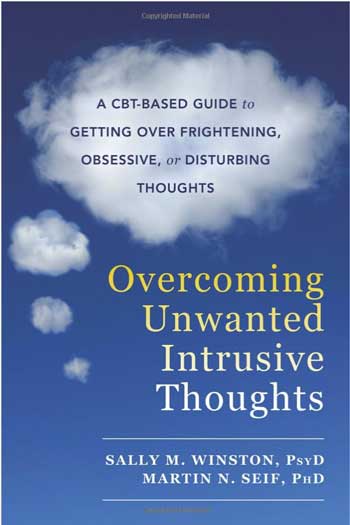 5) Overcoming Unwanted Intrusive Thoughts A CBT-Based Guide to Getting Over Frightening, Obsessive, or Disturbing Thoughts Sally M. Winston PsyD, Martin N. Seif PhD
5) Overcoming Unwanted Intrusive Thoughts A CBT-Based Guide to Getting Over Frightening, Obsessive, or Disturbing Thoughts Sally M. Winston PsyD, Martin N. Seif PhD
About the Book:
You are not your thoughts!
If you suffer from unwanted, intrusive, frightening, or even disturbing thoughts, you might worry about what these thoughts mean about you. Thoughts can seem like messages—are they trying to tell you something?But the truth is that they are just thoughts, and don’t necessarily mean anything. Sane and good people have them. If you are someone who is plagued by thoughts you don’t want—thoughts that scare you, or thoughts you can’t tell anyone about—this book may change your life.
In this compassionate guide, you’ll discover the different kinds of disturbing thoughts, myths that surround your thoughts, and how your brain has a tendency to get “stuck” in a cycle of unwanted rumination. You’ll also learn why common techniques to get rid of these thoughts can backfire. And finally, you’ll learn powerful cognitive behavioral skills to help you cope with and move beyond your thoughts, so you can focus on living the life you want. Your thoughts will still occur, but you will be better able to cope with them—without dread, guilt, or shame.
If you have unwanted thoughts, you should remember that you aren’t alone. In fact, there are millions of people just like you—good people who have awful thoughts, gentle people with violent thoughts, and sane people with “crazy” thoughts. This book will show you how to move past your thoughts so you can reclaim your life!
My Thoughts:
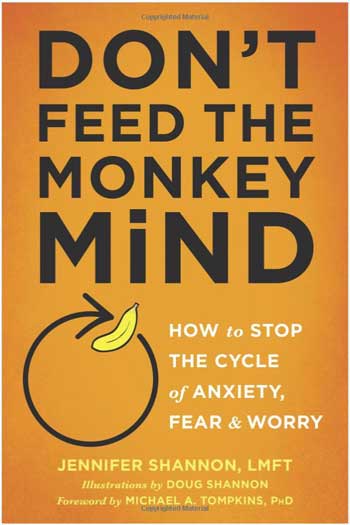 6) Don’t Feed the Monkey Mind How to Stop the Cycle of Anxiety, Fear, and Worry Jennifer Shannon LMFT, Doug Shannon , Michael A. Tompkins PhD, ABPP
6) Don’t Feed the Monkey Mind How to Stop the Cycle of Anxiety, Fear, and Worry Jennifer Shannon LMFT, Doug Shannon , Michael A. Tompkins PhD, ABPP
About the Book:
The very things we do to control anxiety can make anxiety worse. This unique guide offers a cognitive behavioral therapy (CBT)-based approach to help you recognize the constant chatter of your anxious “monkey mind,” stop feeding anxious thoughts, and find the personal peace you crave.
Ancient sages compared the human mind to a monkey: constantly chattering, hopping from branch to branch—endlessly moving from fear to safety. Unfortunately, you can’t switch off the “monkey mind,” but you can stop feeding the monkey—or stop rewarding it by avoiding the things you fear.
By following the exercises in this book, you’ll learn to identify your own anxious thoughts, question those thoughts, and uncover the core fears at play. Once you stop feeding the monkey, there are no limits to how expansive your life can feel.
